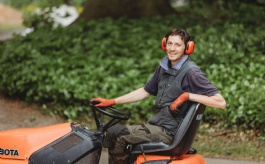View from the Ground

As a groundsman, I am one of the figures that tends to work behind the scenes of what is a very diverse, dynamic and enjoyable workplace and community.
The whole staff body is gratefully fuelled by the kitchen and nobody more so than the grounds team. If you have not noticed us out and about then you must have arrived during lunchtime! I have had the benefit of meeting many parents at various events, most commonly in my role as car park attendant at the summer events, but also around campfires and, more recently, as part of the staff team that led the ski trip - it is an eclectic job and I love it.
The grounds team have been helped by the collective efforts of staff and students during Science week - hopefully you will have noticed our new signs, signposting the designated ‘No-Mow May’ areas. This is where we are letting the grass grow in order for wild flowers to survive and provide a nectar source for our bees and much-needed pollinators of the UK. I will come back to this vital project again shortly.
I will begin by highlighting some of the new changes on site which were achieved by destructive means, as is often the case with groundworks. I hope you will recognise themes of nurture and care for the grounds that underpins our future work, and that the collective efforts to foster nature at Mowden will inspire you to do the same at home.
As you may have noticed, a new parking area has been constructed at the entrance to the astro-turf, with the help of external contractors. To make space for the car park, we had to fell 5 mature trees which took place in the Easter holidays. The loss of these trees is in some way offset by the hedge planting achieved by staff and children during Science Week in March, with whips (bare-root saplings) provided by the Woodland Trust.
I am currently watering these new hedge plants (Hawthorn, Dog-wood, Rose, Field Maple and Hazel) weekly with the help of a water bowser mounted on the front of the tractor, but it is time consuming and a lot of the water runs off on the hard ground. The current drought caused by lack of rainfall is starting to have an impact on the grounds, with grass starting to become more dull or browning in colour. In some of the wilder corners of the estate, we are lacking the wildflowers and abundance that we would expect at this beautiful time of year, when spring supercharges nature into action.
Recently I was sat on the mower during a moment’s pause under the trees beside the cricket pavilion, having been cutting Parkfield. It was a hot day (as we have come to expect), but there was a gentle breeze blowing, with plenty of birdsong and the leaves of the Sycamore above me were rustling in a peacefully, powerful roar. I couldn’t help but feel very lucky, and at the same time very worried about the prospect of maintaining nature and a liveable environment in a less predictable climate in the future. Some of our trees are already stressed and the drought will not be benefiting their health.
As a consequence of the current lack of substantial rainfall, the new hedge row will need to be surveyed in the future to find out how many trees need replacing. However, I have been able to secure 125 trees from a small charity in Barnard Castle called Tree Appeal. A small percentage of these trees will go towards replacing losses in the hedge this autumn, while the remainder will be planted in an area being prepared by my ‘Young Foresters’ who are currently completing their RFS Young Foresters Award. In the coming years I will aim to remove some of the non-native species, such as Laurel and transition the woodland back to a mix of native species which will benefit native flora and fauna.
Seeds2trees is another biodiversity project that I have got the school involved in and we are now in our second year of growing 150 Oak and Hazel saplings from acorns and Cobnuts. Seeds2trees are a great charity and their Outreach Officer Lara has given a few inspirational workshops growing on trees with the students. This is a relationship we hope to maintain due to the huge potential for positive impact that the project has for UK woodland development. While there will only be 150 trees leaving Mowden at the end of the projects first cycle, those trees will be amalgamated with the trees grown by other local people and community groups to amass enough for full-woodland scale forestry projects. This proves that the cumulative effect of small actions can be a powerful force for good!
If this piece has inspired you to plant some trees on your own land then please get in touch, or pull me aside if you see me round the grounds and I will try and advise you or point you in the direction of better advice!
Thank you for reading.
Mr J. Rowe









